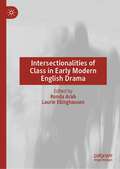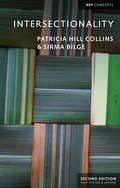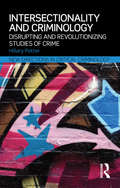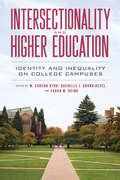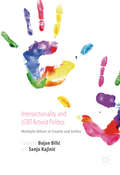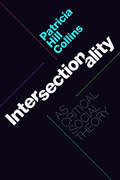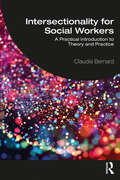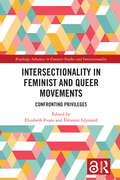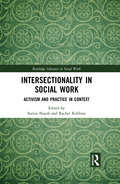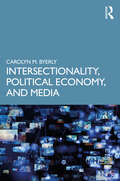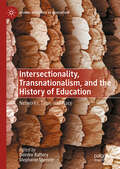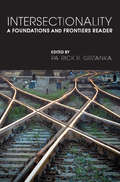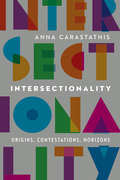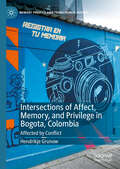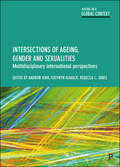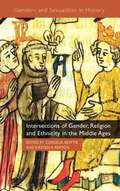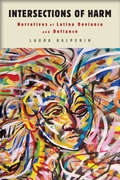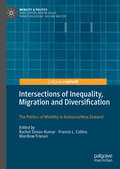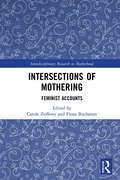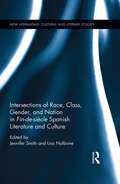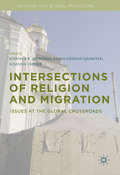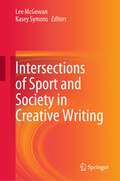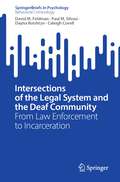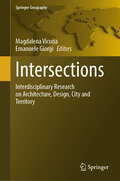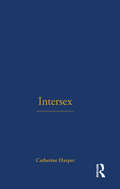- Table View
- List View
Intersectionalities of Class in Early Modern English Drama
by Laurie Ellinghausen Ronda ArabDefining class broadly as an identity categorization based on status, wealth, family, bloodlines, and occupation, Intersectionalities of Class in Early Modern English Drama e xplores class as a complicated, contingent phenomenon modified by a wider range of social categories apart from those defining terms, including, but not limited to, race, gender, religion, and sexuality. This collection of essays – featuring a range of international contributors – explores a broad range of questions about the intersectional factors influencing class status in early modern England, including how cultural behaviors and non-class social categories affected status and social mobility, in what ways hegemonies of elite prerogatives could be disrupted or entrenched by the myriad of intersectional factors that informed social identity, and how class position informed the embodied experience and expression of affect, gender, sexuality, and race as well as relationships to place, space, land, and the natural and civic worlds.
Intersectionality (Key Concepts)
by Patricia Hill Collins Sirma BilgeThe concept of intersectionality has become a central topic in academic and activist circles alike. But what exactly does it mean, and why has it emerged as such a vital lens through which to explore how social inequalities of race, class, gender, sexuality, age, ability, and ethnicity shape one another? In this fully revised and expanded second edition of their popular text, Patricia Hill Collins and Sirma Bilge provide a much-needed introduction to the field of intersectional knowledge and praxis. Analyzing the emergence, growth, and contours of the concept of intersectionality, the authors also consider its global reach through an array of new topics such as the rise of far-right populism, reproductive justice, climate change, and digital environments and cultures. Accessibly written and drawing on a plethora of lively examples to illustrate its arguments, the book highlights intersectionality’s potential for understanding complex architecture of social and economic inequalities and bringing about social justice-oriented change. Intersectionality will be an invaluable resource for anyone grappling with the main ideas, debates, and new directions in this field.
Intersectionality and Criminology: Disrupting and revolutionizing studies of crime (New Directions in Critical Criminology)
by Hillary PotterThe use of intersectionality theory in the social sciences has proliferated in the past several years, putting forward the argument that the interconnected identities of individuals, and the way these identities are perceived and responded to by others, must be a necessary part of any analysis. Fundamentally, intersectionality claims that not only are people’s lived experiences affected by their racial identity and by their gender identity, but that these identities, and others, continually operate together and affect each other. With "official" statistical data that indicate people of Color have higher offending and victimization rates than White people, and with the overrepresentation of men and people of Color in the criminal legal system, new theories are required that address these phenomena and that are devoid of stereotypical or debasing underpinnings. Intersectionality and Criminology provides a comprehensive review of the need for, and use of, intersectionality in the study of crime, criminality, and the criminal legal system. This is essential reading for academics and students researching and studying in the fields of crime, criminal justice, theoretical criminology, and gender, race, and socioeconomic class.
Intersectionality and Higher Education: Identity and Inequality on College Campuses
by Terry-Ann Jones Elizabeth M. Lee Sarah M. Ovink W. Carson Byrd Derrick R. Brooms Rachelle J. Brunn-Bevel Antron D Mahoney Marcela G. Cuellar R. Nicole Johnson-Ahorlu Deborah M. Warnock Kristen A. Clayton Victor E. Ray Tonya Maynard Denise Goerisch Bedelia N. Richards Melanie Jones Gast Ervin Maliq Matthew Orkideh Mohajeri Fernando Rodriguez Finn Schneider Ophelie Rowe-Allen Meredith Smith Tonisha B. Lane Annemarie Vaccaro Ezekiel Kimball Megan Nanney Susan V. IversonThough colleges and universities are arguably paying more attention to diversity and inclusion than ever before, to what extent do their efforts result in more socially just campuses? Intersectionality and Higher Education examines how race, ethnicity, class, gender, sexuality, sexual orientation, age, disability, nationality, and other identities connect to produce intersected campus experiences. Contributors look at both the individual and institutional perspectives on issues like campus climate, race, class, and gender disparities, LGBTQ student experiences, undergraduate versus graduate students, faculty and staff from varying socioeconomic backgrounds, students with disabilities, undocumented students, and the intersections of two or more of these topics. Taken together, this volume presents an evidence-backed vision of how the twenty-first century higher education landscape should evolve in order to meaningfully support all participants, reduce marginalization, and reach for equity and equality.
Intersectionality and LGBT Activist Politics
by Bojan Bilić Sanja KajinićThis volume combines empirically oriented and theoretically grounded reflections upon various forms of LGBT activist engagement to examine how the notion of intersectionality enters the political context of contemporary Serbia and Croatia. By uncovering experiences of multiple oppression and voicing fear and frustration that accompany exclusionary practices, the contributions to this book seek to reinvigorate the critical potential of intersectionality, in order to generate the basis for wider political alliances and solidarities in the post-Yugoslav space. The authors, both activists and academics, challenge the systematic absence of discussions of (post-)Yugoslav LGBT activist initiatives in recent social science scholarship, and show how emancipatory politics of resistance can reshape what is possible to imagine as identity and community in post-war and post-socialist societies. This book will be of interest to scholars and students in the areas of history and politics of Yugoslavia and the post-Yugoslav states, as well as to those working in the fields of political sociology, European studies, social movements, gay and lesbian studies, gender studies, and queer theory and activism.
Intersectionality as Critical Social Theory
by Patricia Hill CollinsIn Intersectionality as Critical Social Theory Patricia Hill Collins offers a set of analytical tools for those wishing to develop intersectionality's capability to theorize social inequality in ways that would facilitate social change. While intersectionality helps shed light on contemporary social issues, Collins notes that it has yet to reach its full potential as a critical social theory. She contends that for intersectionality to fully realize its power, its practitioners must critically reflect on its assumptions, epistemologies, and methods. She places intersectionality in dialog with several theoretical traditions—from the Frankfurt school to black feminist thought—to sharpen its definition and foreground its singular critical purchase, thereby providing a capacious interrogation into intersectionality's potential to reshape the world.
Intersectionality for Social Workers: A Practical Introduction to Theory and Practice
by Claudia BernardThis book explores how intersectionality theory can be applied to social work practice with children and families, older people and mental health service users, and used to engage with diversity and difference in social work education and research. With case-study examples and practice questions throughout, the book provides a model for integrating intersectionality theory into social work practice. It highlights the ways intersectional theory helps us to understand the complexities of working with the interlocking nature of problematised elements such as gender, race, class, sexuality, disability, and other axes of structural inequalities experienced by groups in subjugated social locations. Intersectionality is used to examine multiple forms of inequalities and the complexities and questions they give rise to in social work practice. The emphasis throughout is that intersectional approaches can open up social work practice to new understandings of the complex linkages of multiple and intersecting systems of oppression that shape the lived experiences of diverse groups of service users. Providing an introduction to an intersectional theoretical framework for understanding the lives and experiences of socially disadvantaged service users, Intersectionality for Social Workers will be required reading on all modules on anti-oppressive and anti-discriminatory practice, sociology, and ethics and values in social work.
Intersectionality in Feminist and Queer Movements: Confronting Privileges (Routledge Advances in Feminist Studies and Intersectionality)
by Elizabeth Evans Éléonore LépinardExamining the ways in which feminist and queer activists confront privilege through the use of intersectionality, this edited collection presents empirical case studies from around the world to consider how intersectionality has been taken up (or indeed contested) by activists in order to expose and resist privilege. The volume sets out three key ways in which intersectionality operates within feminist and queer movements: it is used as a collective identity, as a strategy for forming coalitions, and as a repertoire for inclusivity. The case studies presented in this book then evaluate the extent to which some, or all, of these types of intersectional activism are used to confront manifestations of privilege. Drawing upon a wide range of cases from across time and space, this volume explores the difficulties with which activists often grapple when it comes to translating the desire for intersectionality into a praxis which confronts privilege. Addressing inter-related and politically relevant questions concerning how we apply and theorise intersectionality in our studies of feminist and queer movements, this timely edited collection will be of interest to students and scholars from across the social sciences and humanities with an interest in gender and feminism, LGBT+ and queer studies, and social movement studies.
Intersectionality in Social Work: Activism and Practice in Context (Routledge Advances in Social Work)
by Suryia Nayak Rachel RobbinsThis ground breaking book is an innovative, passionate and provocative exploration of intersectionality. The sustained emphasis on activism and practice reasserts the potency of intersectionality borne out of Black feminism. The rare and pioneering international reach of this book crosses four continents. In this book context matters: there is no intersectionality without context! Resting on the premise that we cannot work for the liberation of individuals, communities and societies without intersectionality, this book asks: How does intersectionality challenge the structures and discourses of social work education, management and organisation? What is the revolutionary potential of intersectionality? Intersectional in its method and content, the blend of practice, activism, research and theory troubles geopolitical and disciplinary boundaries. The range of topics include: Islamophobia, immigration, feminist movements, social work education, violence against women and girls, gender, sexuality, race, disability, age, religion, nationality, citizenship policy and legal frameworks. This book will appeal to activists for social justice, social work practitioners, researchers, lecturers, students and those working in the field of Black feminist thinking. The focus on the activism of intersectionality provides a clear pathway into Black feminist thinking and its application to social work internationally and to emancipatory collective political activism worldwide.
Intersectionality, Political Economy, and Media
by Carolyn M. ByerlyThis textbook considers the critical relationship between gender, race, and class and the political economy of media, providing an accessible introduction for students.Carolyn M. Byerly integrates gender, race, and class analysis in posing an intersectional political economy (IPE) of media theory, and demonstrates how that theory applies in examining communication laws, policies, technology, and other aspects of media today. By synthesizing feminist and critical race theories with more traditional class analysis, this book offers a unified approach to examining the media. Individual chapters delve into communication policy, ownership, governance, labor, and technology issues, with a concluding chapter that explores future research. The book situates citizen challenges to the media’s control by a small power elite within a dialectic of struggle and highlights specific campaigns that have pursued successful policy and media reform. Several short case studies by other authors illustrate how an IPE investigation can be undertaken.This is a key text for undergraduate and graduate media and communication courses such as Media and Society, Political Economy of Media, Gender, Race and Media, Research Methods, and more. It will also appeal to social science classes such as Media Sociology, Labor Studies, and Political Economy Research.
Intersectionality, Transnationalism, and the History of Education: Networks, Time, and Place (Global Histories of Education)
by Deirdre Raftery Stephanie SpencerThis volume brings together a diverse range of contributors to explore the significance of intersectionality and transnationalism, with reference to the history of education. The chapters cover a range of educational spaces and places and demonstrate the possibilities that theoretical approaches can offer to scholars at all levels of their academic career. The chapters focus specifically on women’s activism in order to maintain a coherent framework of research that is brought together in an introduction and concluding thoughts. The significance of gender as relational and a symbol of power ensures that men and masculinities are not overlooked but recognized as integral to understanding gender dynamics as they affected women’s education and the ways in which that education took place.
Intersectionality: A Foundations and Frontiers Reader
by Patrick GrzankaIntersectionality: A Foundations and Frontiers Reader is an accessible, primary-source driven exploration of intersectionality in sociology and related fields. The book maps the origins of the concept, particularly in Black feminist thought and sociology, opens the discourse to challenges and applications across disciplines and outside academia, and explores the leading edges of scholarship to reveal important new directions for inquiry and activism.Charting the development of intersectionality as an intellectual and political movement, Patrick R. Grzanka brings together in one text both foundational readings and emerging classics. Original material includes: Grzanka's nuanced introduction which provides broad context and poses guiding questions; thematic unit introductions; author biographies and suggestions for further reading to ground each excerpt; and a conclusion by Bonnie Thornton Dill reflecting on the past, present, and future of intersectionality. With its balanced mix of analytical, applied, and original content, Intersectionality is an essential component of any course on race, class, and gender, feminist theory, or social inequalities.
Intersectionality: Origins, Contestations, Horizons (Expanding Frontiers: Interdisciplinary Approaches to Studies of Women, Gender, and Sexuality)
by Anna CarastathisA 2017 Choice Outstanding Academic TitleIntersectionality intervenes in the field of intersectionality studies: the integrative examination of the effects of racial, gendered, and class power on people’s lives. While “intersectionality” circulates as a buzzword, Anna Carastathis joins other critical voices to urge a more careful reading. Challenging the narratives of arrival that surround it, Carastathis argues that intersectionality is a horizon, illuminating ways of thinking that have yet to be realized; consequently, calls to “go beyond” intersectionality are premature. A provisional interpretation of intersectionality can disorient habits of essentialism, categorial purity, and prototypicality and overcome dynamics of segregation and subordination in political movements. Through a close reading of critical race theorist Kimberlé Williams Crenshaw’s germinal texts, published more than twenty-five years ago, Carastathis urges analytic clarity, contextual rigor, and a politicized, historicized understanding of this widely traveling concept. Intersectionality’s roots in social justice movements and critical intellectual projects—specifically Black feminism—must be retraced and synthesized with a decolonial analysis so its radical potential to actualize coalitions can be enacted.
Intersections of Affect, Memory, and Privilege in Bogota, Colombia: Affected by Conflict (Memory Politics and Transitional Justice)
by Hendrikje GrunowThis book explores the intersections of affect, memory and privilege among Bogota’s upper middle class. Combining approaches from memory studies, anthropology, feminist and affect theory, this work is concerned with the implications for the present and potential futures contained in affective encounters. It is structured along four affects describing the social, spatial, historical and political aspects of ‘being affected’ by the Colombian conflict. After showing how the Colombian conflict is rooted in specific affective relationships to land, disappointment and crushed hopes in the context of various peace negotiations are portrayed as the central experiences nurturing a sense of a doubling or re-experiencing of past emotions. Then, a specifically upper-middle class emotional habitus and its implication for the social connections to people more directly affected by the conflict are outlined, and peace as an upper middle-class affect is revealed as a privilege not everyone deserves.
Intersections of Ageing, Gender and Sexualities: Multidisciplinary International Perspectives (Ageing in a Global Context)
by Andrew King, Kathryn Almack and Rebecca L. JonesAvailable Open Access under CC-BY-NC licence. With an increasingly diverse ageing population, we need to expand our understanding of how social divisions intersect to affect outcomes in later life. This edited collection examines ageing, gender, and sexualities from multidisciplinary and geographically diverse perspectives and looks at how these factors combine with other social divisions to affect experiences of ageing. It draws on theory and empirical data to provide both conceptual knowledge and clear ‘real-world’ illustrations. The book includes section introductions to guide the reader through the debates and ideas and a glossary offering clear definitions of key terms and concepts.
Intersections of Gender, Religion and Ethnicity in the Middle Ages
by Cordelia Beattie Kirsten A. FentonThis collection of essays focuses attention on how medieval gender intersects with other categories of difference, particularly religion and ethnicity. It treats the period c. 800-1500, with a particular focus on the era of the Gregorian reform movement, the First Crusade, and its linked attacks on Jews at home.
Intersections of Harm
by Laura HalperinIn this innovative new study, Laura Halperin examines literary representations of harm inflicted on Latinas' minds and bodies, and on the places Latinas inhabit, but she also explores how hope can be found amid so much harm. Analyzing contemporary memoirs and novels by Irene Vilar, Loida Maritza Pérez, Ana Castillo, Cristina García, and Julia Alvarez, she argues that the individual harm experienced by Latinas needs to be understood in relation to the collective histories of aggression against their communities. Intersections of Harm is more than just a nuanced examination of the intersections among race, ethnicity, class, gender, and sexuality. It also explores the intersections of deviance and defiance, individual and collective, and mind, body, and place. Halperin proposes that, ironically, the harmful ascriptions of Latina deviance are tied to the hopeful expressions of Latina defiance. While the Latina protagonists' defiance feeds into the labels of deviance imposed on them, it also fuels the protagonists' ability to resist such harmful treatment. In this analysis, Halperin broadens the parameters of literary studies of female madness, as she compels us to shift our understanding of where madness lies. She insists that the madness readily attributed to individual Latinas is entwined with the madness of institutional structures of oppression, and she maintains that psychological harm is bound together with physical and geopolitical harm. In her pan-Latina study, Halperin shows how each writer's work emerges from a unique set of locales and histories, but she also traces a network of connections among them. Bringing together concepts from feminism, postcolonialism, illness studies, and ecocriticism, Intersections of Harm opens up exciting new avenues for Latina/o studies.
Intersections of Inequality, Migration and Diversification: The Politics of Mobility in Aotearoa/New Zealand (Mobility & Politics)
by Francis L. Collins Rachel Simon-Kumar Wardlow FriesenThis book examines the relationship between migration, diversification and inequality in Aotearoa/New Zealand. The authors advance a view of migration as a diversifying force, arguing that it is necessary to grapple with the intersection of group identities, state policy and economic opportunities as part of the formation of inequalities that have deep historical legacies and substantial future implications. Exploring evidence for inequality amongst migrant populations, the book also addresses the role of multicultural politics and migration policy in entrenching inequalities, and the consequences of migrant inequalities for political participation, youth development and urban life.
Intersections of Mothering: Feminist Accounts (Interdisciplinary Research in Motherhood)
by Carole Zufferey Fiona BuchananThis book presents new interdisciplinary and intersectional research about women as mothers, highlighting that alternative accounts of mothering can challenge normative societal assumptions and broaden understandings of women as mothers, mothering and motherhoods. Mothering occurs within unequal power relations associated with the disadvantages and privileges of an unjust and patriarchal society. Social inequalities associated with gender, race, class, age, ability, sexuality, violence and nationalism intersect in the lives of women as mothers, to shape their lived experiences and perspectives on mothering. Showcasing the breadth and depth of feminist research on mothering, this book gives attention to the diversity of ways in which mothering is constructed and responded to as well as how mothering is experienced. Drawing on intersectional feminist thought, the book challenges normative visions of ‘good mothering’ and interrogates constructs of ‘bad mothering’. It brings together insights from multidisciplinary scholars who use feminist approaches in their research on mothering, to inform policy development and practice when working with women as mothers in diverse circumstances. Intersections of Mothering highlights the complexities of mothering in a contemporary world, show the benefits of considering mothering through an intersectional feminist lens, make visible lived experiences of mothers and provides challenges to dominant imaginings of and service responses to women as mothers. Intersections of Mothering will be essential reading for interdisciplinary scholars and students in criminology, gender and women’s studies, motherhood studies, social welfare, social work, social policy and public health policy, in addition to practitioners and policy workers that respond to women as mothers.
Intersections of Race, Class, Gender, and Nation in Fin-de-siècle Spanish Literature and Culture (New Hispanisms: Cultural and Literary Studies)
by Jennifer Smith Lisa NalboneThis volume focuses on intersections of race, class, gender, and nation in the formation of the fin-de-siècle Spanish and Spanish colonial subject. Despite the wealth of research produced on gender, social class, race, and national identity few studies have focused on how these categories interacted, frequently operating simultaneously to reveal contexts in which dominated groups were dominating and vice versa. Such revelations call into question metanarratives about the exploitation of one group by another and bring to light interlocking systems of identity formation, and consequently oppression, that are difficult to disentangle. The authors included here study this dynamic in a variety of genres and venues, namely the essay, the novel, the short story, theater, and zarzuelas. These essays cover canonical authors such as Benito Pérez Galdós and Emilia Pardo Bazán, and understudied female authors such as Rosario de Acuña and Belén Sárraga. The authors included here study this dynamic in a variety of genres and venues, namely the essay, the novel, the short story, theater, and zarzuelas. The volume builds on recent scholarship on race, class, gender, and nation by focusing specifically on the intersections of these categories, and by studying this dynamic in popular culture, visual culture, and in the works of both canonical and lesser-known authors.
Intersections of Religion and Migration
by Jennifer B. Saunders Elena Fiddian-Qasmiyeh Susanna SnyderThis innovative volume introduces readers to a variety of disciplinary and methodological approaches used to examine the intersections of religion and migration. A range of leading figures in this field consider the roles of religion throughout various types of migration, including forced, voluntary, and economic. They discuss examples of migrations at all levels, from local to global, and critically examine case studies from various regional contexts across the globe. The book grapples with the linkages and feedback between religion and migration, exploring immigrant congregations, activism among and between religious groups, and innovations in religious thought in light of migration experiences, among other themes. The contributors demonstrate that religion is an important factor in migration studies and that attention to the intersection between religion and migration augments and enriches our understandings of religion. Ultimately, this volume provides a crucial survey of a burgeoning cross-disciplinary, interreligious, and global area of study.
Intersections of Sport and Society in Creative Writing
by Lee McGowan Kasey SymonsThis edited collection is positioned at the nexus of sports, society and creative writing. In its explorations of the intersections of sports writing, analysis of literary contributions and examinations of craft, it offers rare consideration of a rich diversity of form in narratives that occur in, and as creative practice. Included in the collection are dynamic academic investigations into football writing and poetry focused on community sporting activities in Afghanistan, to those addressing the intersections of writing and boxing in the reflexive reclamation of the post-trauma self, the absence of women in the rodeo and who and what is represented in our sports shelves. This book breaks new ground in approaches to sport’s role in creative writing and what creative writing can provide in furthering our understanding of sport in society. The works in this edited book draw on a diverse range of methods to interrogate the processes, concepts and liminal spaces through an intersectional array of voices, offering analysis and insight into the application of creative writing knowledge and practice in relation to sport and its impact on wider discipline discussion and research. It is relevant to students and scholars studying and researching creative writing, sports writing, sports studies, cultural studies and sports media studies.
Intersections of the Legal System and the Deaf Community: From Law Enforcement to Incarceration (SpringerBriefs in Psychology)
by David M. Feldman Paul M. Silvasi Dayna Rotshtyn Caleigh CovellThis book examines how those with disabilities, and in particular, the Deaf and hard-of-hearing, are impacted by the influence language and culture in policing, criminal law, and corrections. Frequently left out of policy making and research, almost no resources exist that can inform and aid law enforcement, legal, and correctional officials on culturally competent interactions with the Deaf and hard-of-hearing. As a result, this group is at a distinct disadvantage when dealing with law enforcement or the courts as well as being vastly underserved, which often lead to negative outcomes for the Deaf suspect/defendant/inmate as they attempt to interact with law enforcement and navigate the legal system. In a step-by-step presentation from arrest to incarceration each chapter will discuss a specific part of the legal system. As well as providing information on the topic, this book can serve as an important resource to the myriad of issues and difficulties that may be experiences by the Deaf suspect, defendant, or inmate, as well as by law enforcement officers, attorneys, and correctional officers. To illustrate these issues, previous cases of Deaf suspects, defendants, and inmates will be presented and discussed to clarify key issues and to provide a perspective of the problem. Each chapter dealing with these issues will also provide suggestions for more culturally competent interactions between the Deaf community and the legal system.
Intersections: Interdisciplinary Research on Architecture, Design, City and Territory (Springer Geography)
by Emanuele Giorgi Magdalena VicuñaThis book presents a critical vision of the role of architecture and design in constantly changing cities, territories and societies from a Latin American perspective. Topics include, pandemic and post-pandemic; public culture and aesthetics; right to housing, city and services, gender approach and ethics of care; heritage and cultures, critical methodology; sustainable landscapes; perceptions and emotions; processes and technologies; territories and intermediate cities. The IV Intersections Congress was organized by high-level universities in Latin American: faculties of architecture, design and urban studies that came together during an historical moment of great changes. The congress was an invitation to weave conversations that address the tensions emerging in local, regional and global debates, with the goal of understanding how architecture, design, city and territory are a relevant intersection for these tensions. This translation was done with the help of artificial intelligence. A subsequent human revision was done primarily in terms of content.
Intersex
by Catherine HarperIntersex' is the condition whereby an individual is born with biological features that are simultaneously perceived as male and female. Ranging from the ambiguous genitalia of the true 'hermaphrodite' to the 'mildly or internally intersexed', the condition may be as common as cleft palate. Like cleft palate, it is hidden and surgically altered, but for very different reasons. This important book draws heavily on the personal testimony of intersexed individuals, their loved ones, and medical carers. The impact of early sex-assignment surgery on an individual's later life is examined within the context of ethical and clinical questions. Harper challenges the conventional and radical 'treatment' of intersexuality through non-consensual infant sex-assignment surgery. In doing so she exposes powerful myths, taboos, and constructions of gender - the perfect phallus, a bi-polar model of gender and the infallibility of medical decisions. Handling sensitive material with care, this book deepens our understanding of a condition that has itself only been medically understood in recent years.
